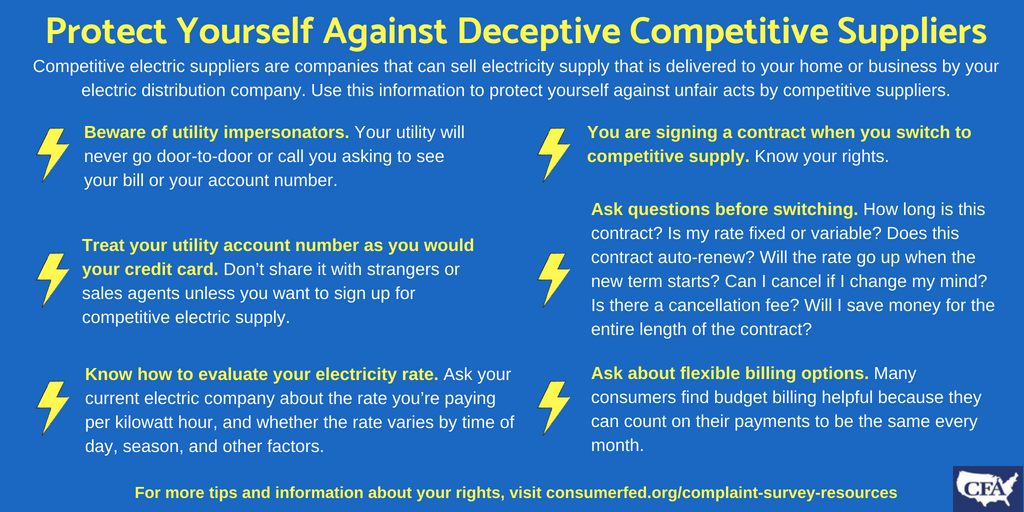If there are competitive electric suppliers in the area where you live, more than likely you’ve gotten calls or mail from companies claiming they can save you money on your electricity. Perhaps you received a knock on your door from a salesperson asking to see your electric bill and before you know it, you have signed a contract with a competitive supplier without really knowing what you agreed to. You may even discover with time that you are not, in fact, saving money at all and that you are locked in for longer than you realized.
So what exactly is a competitive electric supplier? It used to be that the companies that sold electricity to consumers and businesses were the same companies that delivered it to them through the power lines. Now in many parts of the country there is a choice of companies from which to buy electricity. If you choose to get it from a competitive electric supplier, it will still be delivered to your home or business by the company that owns the poles and lines. You will either get separate bills, one for the electricity you use and the other for delivering it to you, or you may get a bill that includes both charges. If you don’t switch to a competitive supplier, you’ll continue to buy your electricity and have it delivered by the same company.
A study released in March 2018 by the Office of the Massachusetts Attorney General found that individual residential electricity supply customers in the Commonwealth who switched to a competitive supplier paid $176.8 million more than they would have paid if they had received electricity supply from their distribution companies over a two-year period spanning from July 2015 to June 2017. The study also found that 88 percent of all Commonwealth individual residential electricity customers who switched to a competitive supplier paid more during the two-year period.
In order to protect yourself against unfair or deceptive acts by competitive suppliers, we recommend that you:
- Beware of “Utility Impersonators.” These are companies that falsely claim to be from your current electricity supplier. Your utility will never go door-door or call you asking to see your bill or your account number – it already has that information.
- Treat your utility account number as you would your credit card. Don’t share your account number with strangers or sales agents unless you want to sign up for competitive electric supply. If you give your account number to an unscrupulous agent, the agent can sign you up without your knowledge.
- Know how to evaluate your electricity rate. Contact your current electric company to get information about the rate you’re paying now per kilowatt hour, which is how electricity is priced, and whether the rate varies by time of day, the seasons and other factors so you can compare “apples to apples” when considering offers from competitive suppliers.
- Be aware that you are signing a contract when you switch to competitive supply! Know your rights and ask questions: (1) how long is this contract, (2) is my rate fixed or variable, (3) does this contract auto-renew and, if so, will the rate go up when the new term starts, (4) can I cancel if I change my mind and is there a cancellation fee, (5) will I save money for the entire length of the contract?
- Ask about flexible billing options. Many consumers find budget billing helpful because they can count on their payments to be the same every month. If you have concerns about being able to afford your electric service, find out what payment options the competitive service offers.
If there is competition for electric suppliers in your area, your state public utilities commission or department may provide advice about what to look for and what to watch out for. Go to its website or call to get the information you need to make a smart choice. If you have concerns about a competitive supplier’s sales or business practices, report them to your utilities regulator and your state or local consumer protection agency.

This blog is one of a series of articles contributed by state and local consumer agencies in connection with the annual survey about consumer complaints conducted by Consumer Federation of America. The survey report provides “real life” examples of complaints and tips for consumers. Have a consumer problem or question? Find your state or local consumer agency at https://www.usa.gov/state-consumer.

